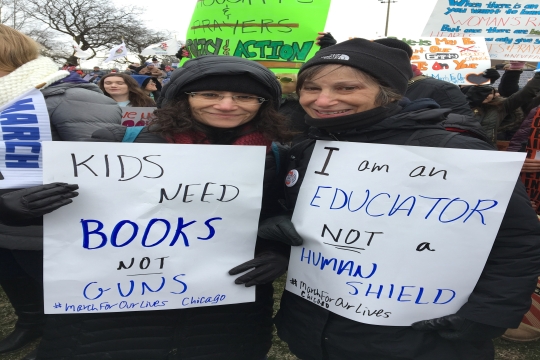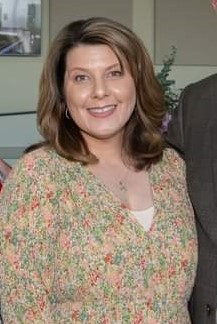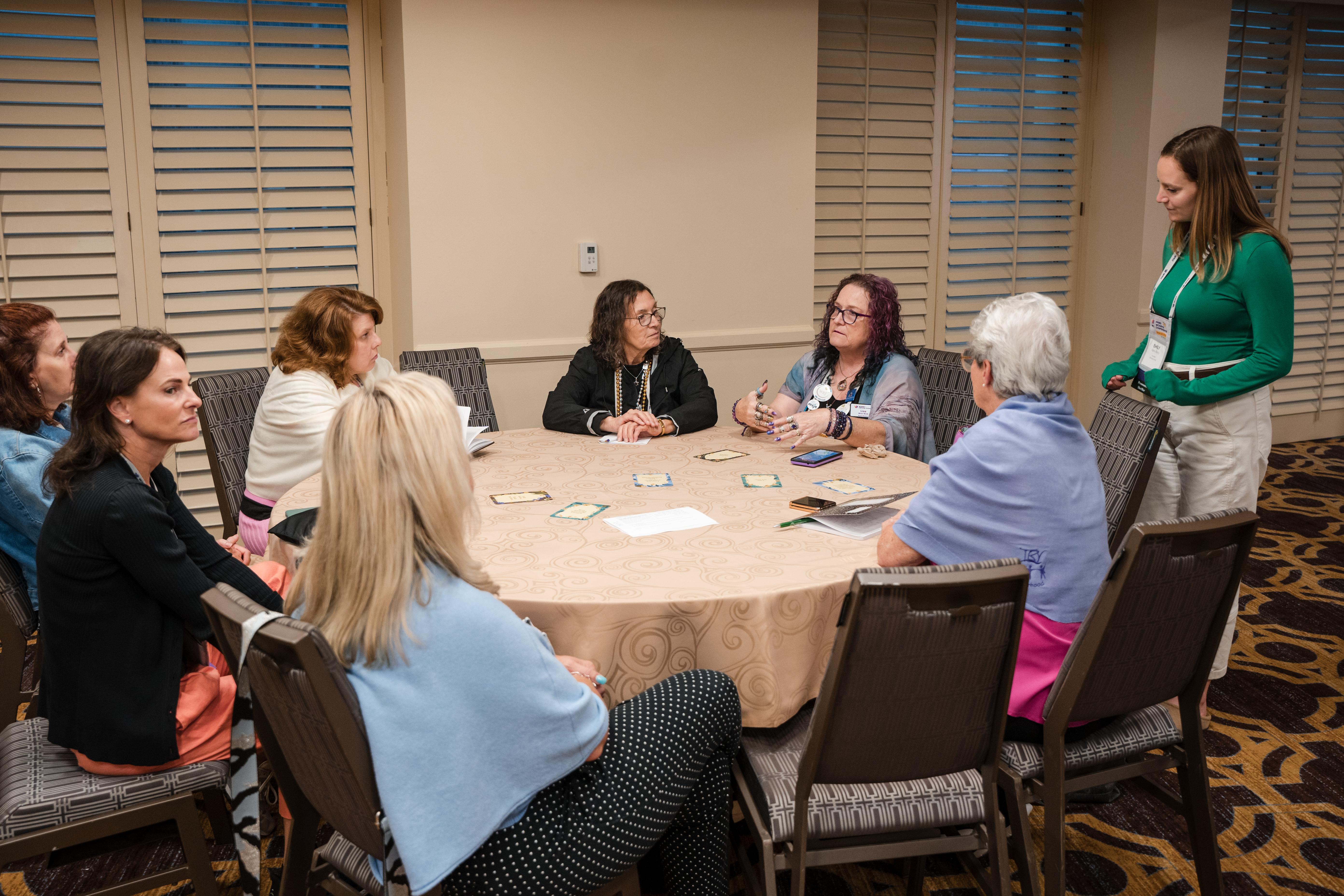
My journey within Women of Reform Judaism, although still very much in its beginning stages, has had a profound impact on my connection to Judaism. Having recently converted, I wasn’t sure where I would belong within the organization. WRJ is founded on the three pillars of sisterhood, spirituality, and social justice. When I made the decision to attend WRJ’s 2024 Fried Women’s Conference in New Orleans, I could only imagine how meaningful it might be to witness these principles in action. As a first-time Fried attendee, I was eager to spend quality time with my temple sisterhood, expand my Jewish knowledge, and support my friend Cheryl, who was elected to WRJ’s Executive Committee this year.
As I anticipated the weekend of the conference, WRJ organizers made thoughtful use of technology to simplify the busy weekend. Through thoughtful use of Mighty Networks and Whova, our event app, I was able to navigate the events of the weekend and decide which workshops I most wanted to attend. I could “friend” other attendees with whom I shared interests, join chats on interesting topics, take polls, and plan meet-ups. The best aspect of it was being able to map out my agenda and set reminders for myself. Being able to plan ahead did a lot to calm my anxiety.
It was also a thoughtful touch of the organizers to pair first-time attendees of the national conference with a seasoned WRJ buddy. I was very fortunate in my buddy, Laney. She went above and beyond to ensure my travel went smoothly and I received the support I needed through the conference. Her thoughtfulness put me at ease.
Immediately as I entered the hotel in New Orleans, I felt included. As I stepped into line to check in, there were a few women ahead of me who seemed to be close. Within seconds of seeing me, they welcomed me like I was one of them, a long-lost dear friend, even though I was a total stranger. This was the first of many acts of warmth and kindness I’d experience over the weekend.
Next, I picked up my registration packet. Here, I was surprised yet again. In addition to name badges and lanyards, I received WRJ tote bags stuffed with embossed note pads and pens, Jewish magazines, and snacks. WRJ also treated me to several complimentary books about Reform Jewish history and culture.
Immediately following a new timer's meeting, there was an actual parade through the hotel! WRJ hired one of New Orleans’ brass bands. As the music blared, our crowd followed the band, smiling wide and waving vibrant handkerchiefs printed with the event’s name. All at once, we were immersed in the lively culture of the city and in a community of attendees from across the world.
The next morning, I began my day with a workshop I’d added to my agenda as soon as I’d seen it: “What Does Spirituality Mean in Reform Judaism and How is it Evolving?” It was led by Rabbi Caroline Sim and Ally Karpel. In it, they discussed how our values, morals, and public consciousness affect spiritualty. They spoke about how historical events in the secular world shape the spiritual world. For example, the Classical Reform Movement of the 19th and 20th centuries modernized Judaism. Many Jews at that time wanted to integrate into society rather than continuing to live as a separate community. A profound shift occurred. Reform Jews adopted a more faith-based identity rather than the ethnic or cultural identity of the past. In the United States, services accommodated this shift by being more inclusive of music and of the English language.
Decades later, the Civil Rights Movement called deeply to the souls of Jews who did their best to answer, and the Midcentury Reform Movement began to focus on social action. The Progressive Reform Movement of the 1980s and 1990s encouraged increased access and belonging to Judaism. Interfaith families were welcomed. The Reform Judaism of the present is more particularized. Practice is often more individualized. Spirituality can occur as do-it-yourself practice. A decentralized, globally minded movement has emerged. From what I learned in the workshop, it seems Judaism endures because of its flexibility. As spirituality circles back, what was old is now new. Kabbalah, the mysticism of the 12th century, Hassidim, the returning to nature of the 18th century, and Chavurah, the small groups of like-minded Jews forming religious congregations during 1970s disco era, can be easily modified to mesh with modern practices.
Another workshop that I attended was called “Breaking Down Burnout Through the Power of Kavannah.” While the previous workshop described the evolution of Jewish spirituality, this workshop had the most profound spiritual effect on me. I had no idea how desperately I needed to attend it.
The speaker was a soft-spoken, elegant young lady named Emily Kahn-Perry of Wilshire Boulevard Temple camps. The ladies who sat at my table all had something profound in their eyes, whether it was the pain of fresh personal loss, feelings of helpless concern for their children, or the torture of slowly losing someone you desperately love by way of Alzheimer’s. Each of us knew the painful frustration of caregiving, of doing all we could do but still feeling trapped in a thankless, draining cycle. I felt my own struggles reflected in their stories. We talked about things I’d been feeling but didn’t know had names, like compassion fatigue, empathetic strain, and, of course, burnout.
Feeling seen and heard was cathartic. Then, Emily discussed the power of kavannah, which means “intention” or “sincere feeling, direction of the heart.” She talked about the importance of Shabbat rest, and of creating healthy boundaries. She talked about shalom bayit, peace in the home. And she spoke of bikur cholem, caring for the sick, which resonated with everyone at my table.
I had read about these concepts, but I never felt their importance. I had a profound revelation at that moment: I cannot give fully to those I love unless I save some love for myself, and a Jew must repair herself before she can repair the world. If this had been the only workshop that I attended, it still would have made the entire trip worthwhile.
However, it didn’t stop there. The feelings of spiritual healing and solidarity continued. While delving farther into my experiences at the conference would end up turning this essay into a novella, I’ll stay my hand on these two meaningful sessions, a session connecting me more to the broad spectrum that is ever-evolving Judaism juxtaposed to a session connecting me as an individual Jewish woman to my Jewish sisters through our shared need for kavannah, for peace.
The weekend’s impact continued during worship services. Shabbat was deeply moving and joyously uplifting. Holding hands and dancing with hundreds of Jewish women while belting out “Mi Cha-mocha” might take me out of my comfort zone, but I’d do it again. It was all the more special sharing these moments with my dearest friends, Cheryl, Beverly, Laura, and Kathy, and new friends alike.
The weekend was an opportunity for us to celebrate Cheryl, our sisterhood president, who had been elected to the Executive Committee of Women of Reform Judaism. Seeing her among so many wise, passionate Jewish woman leaders was humbling. I am so lucky to personally know this human being, this Eshet Chayil, a woman of valor. Cheryl has had and continues to have a profound effect on my life, and now her influence reaches a much larger community.
Attending the Fried Women’s Conference in New Orleans was a transformative experience for me. I will forever cherish the memories I made and continue to nourish the most precious gifts that I’ve been given: the friendships with which I’ve been blessed. These women remind me of the importance of tikkun olam, and how important it is to repair myself.
Sisterhood, spirituality, and social justice are the pillars of WRJ, and my pillars are so clearly my sisters who lift me up.
Related Posts
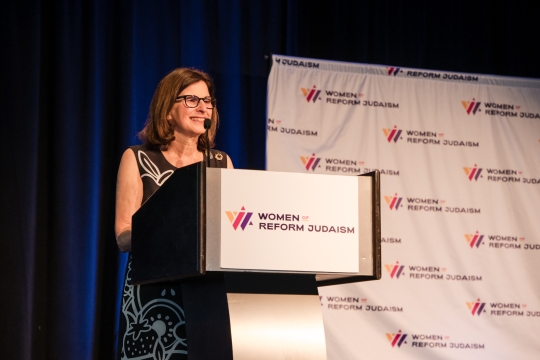
The Power of Relationships Through Sisterhood, Spirituality, and Social Justice
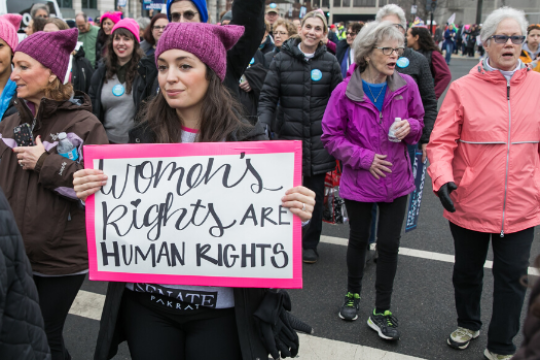
Florida - No, Not the Taylor Swift Song- Something Even Bigger!
